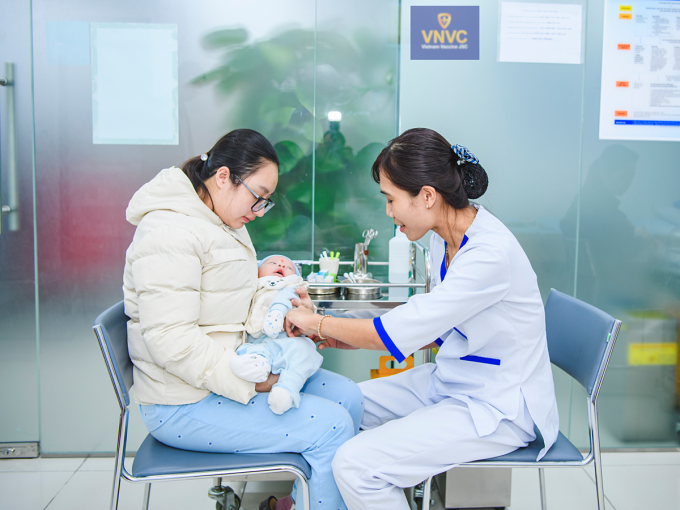Early childhood vaccinations provide effective protection against infectious diseases, saving families money.
Dr. Bui Thanh Phong, Medical Manager of the VNVC Vaccination System, said that many parents have proactively brought their children to VNVC for early hepatitis B vaccination in the past two months, amidst a shortage of vaccines at some public health facilities. This is a sign that parents are increasingly aware of disease prevention for their children from the neonatal stage.
According to Dr. Phong, some injections will no longer be effective if given late. For example, the rotavirus vaccine against acute diarrhea should be completed before 8 months of age; vaccination will no longer be effective after this time. Similarly, the BCG tuberculosis vaccine is most effective when administered within the first 24 hours after birth, with little or no effectiveness in infants and adults.
Up to 95% protection
Thanks to vaccine advancements, many global pandemics have been eradicated or significantly reduced in number, such as smallpox, COVID-19, polio, and measles. The United Nations Children's Fund (UNICEF), in its 2023 State of the World's Children Summary Report , states that vaccinations save 4.4 million lives annually. Of these, approximately 3 million children are saved from highly fatal infectious diseases. If vaccination rates are maintained, vaccines could protect 5.8 million people annually by 2030.

Children receive their first vaccinations at VNVC. Photo: Nhat Linh
According to Dr. Phong, young children have underdeveloped immune systems, making them vulnerable to infectious diseases and serious complications. For example, neonatal tetanus has an incidence and mortality rate of up to 80%, causing the deaths of 500,000 children annually in the late 20th century. Meanwhile, vaccines are available for these diseases, providing up to 95% protection.
The number of deaths from whooping cough decreased from 1.3 million per year to 63,000 in 2013. Measles, considered a "child killer," saw a decrease in deaths from 2.6 million per year to 128,000 in 2021.
According to information from the Department of Preventive Medicine in 2017, approximately 85-95% of children who are fully vaccinated will develop specific immunity that protects their bodies from disease and avoids severe complications.
Creating conditions for comprehensive development
Dr. Phong stated that some diseases leave permanent sequelae in children, such as meningococcal meningitis, Japanese encephalitis, and polio. If children avoid these diseases, they will grow up healthy, preventing complications that affect the nervous system, motor skills, and reproductive function. As a result, they can study and participate in physical activities normally, leading to a brighter future.
Vaccinating children also contributes to creating a strong immune shield for the community. The more children are vaccinated, the lower the likelihood of disease transmission will be for both children and adults.
"Getting all the necessary vaccinations also helps keep children healthy, reduces the overuse of antibiotics which leads to antibiotic resistance, and prolongs the treatment time for many diseases," said Dr. Phong.
Financial savings
According to Dr. Phong, infectious diseases for which vaccines are available are all classified as Group B, meaning they are highly contagious and potentially fatal. In reality, when unvaccinated children contract these diseases, it incurs significant costs such as hospital fees and the time parents or relatives spend caring for them. According to estimates from the US Centers for Disease Control and Prevention (CDC) in 2011-2012, the number of lost working hours due to medical care for children with influenza reached 73 hours (equivalent to more than 9 working days).
In many cases of severe or life-threatening illnesses, such as encephalitis, hospital bills can be enormous, forcing families to borrow money to treat their children. The illness can also leave lasting effects, making children dependent on caregivers.
According to UNICEF, the investment in vaccines is considered a profitable investment. Every dollar spent on vaccinations yields a return of $26. Therefore, instead of spending large sums on treatment and care for sick children, parents can focus on investing in their children's future and working to improve their family's financial situation.

Vaccines help reduce disease rates and support children's holistic development. Source: Parents Together
Vaccination schedule in the first year of life
Dr. Phong said that parents can find out the vaccination schedule for their children at milestones such as newborn, 6 weeks old, 3 months old, 4 months old, 6 months old, 9 months old, 12 months old, or go to a vaccination center to receive advice from a doctor.
Within the first 24 hours after birth, the baby needs to be vaccinated against tuberculosis and hepatitis B. After that, the baby should receive the following vaccines in sequence: rotavirus; the 6-in-1 vaccine against pertussis, diphtheria, tetanus, pneumonia and meningitis caused by Hib, polio, and hepatitis B; and pneumococcal vaccine. If using the 5-in-1 vaccine, the child will need an additional polio or hepatitis B vaccine depending on the specific vaccine.
From 6 months of age, babies can receive the flu vaccine (two doses given one month apart) and the meningococcal meningitis vaccine. From 9 months of age, children should be vaccinated against chickenpox, measles, mumps, and rubella. From 12 months of age, families should have their children vaccinated with a hepatitis A vaccine.
Dr. Phong advises that in addition to vaccinating their children, parents and caregivers should also get vaccinated to avoid the risk of contracting and transmitting diseases to children who do not yet have full immunity. Furthermore, families should implement other preventive measures such as frequent handwashing; wearing masks when going to the hospital; limiting exposure to crowded places, especially for children under one year old; and maintaining a proper diet and engaging in physical exercise to boost immunity.
Nhat Linh
On October 28th, VNVC Vaccination Center organized the 13th Maternal and Child Health Consultation Program at VNVC Thu Duc 2 (Ho Chi Minh City), aiming to update knowledge on new vaccines for newborns. The program included two lectures: "Important Vaccines for Newborns" presented by Dr. Bui Thanh Phong, Medical Manager for Ho Chi Minh City, VNVC Vaccination System, and "Nutrition for a Smart Child from the Womb" presented by MSc. Dr. Tran Thi Hong Loan, Nutritionist, Nutrihome Nutrition Clinic System.
The program is free and can be held in both in-person and online formats. Interested readers can register here.
Source link







![[Photo] Prime Minister Pham Minh Chinh attends the Conference on the Implementation of Tasks for 2026 of the Industry and Trade Sector](/_next/image?url=https%3A%2F%2Fvphoto.vietnam.vn%2Fthumb%2F1200x675%2Fvietnam%2Fresource%2FIMAGE%2F2025%2F12%2F19%2F1766159500458_ndo_br_shared31-jpg.webp&w=3840&q=75)









































































































Comment (0)